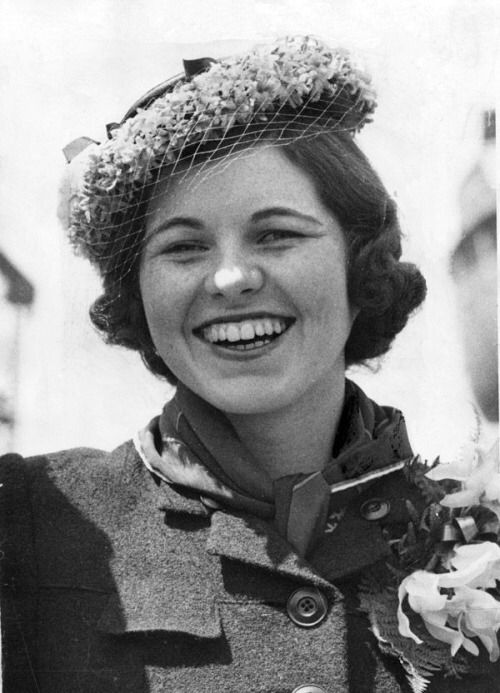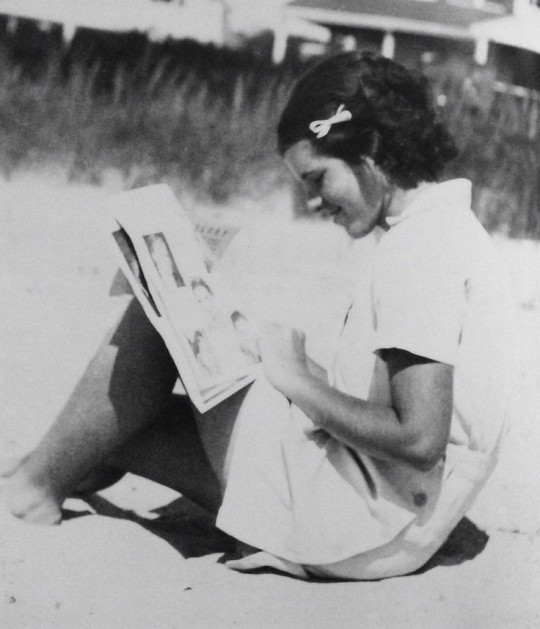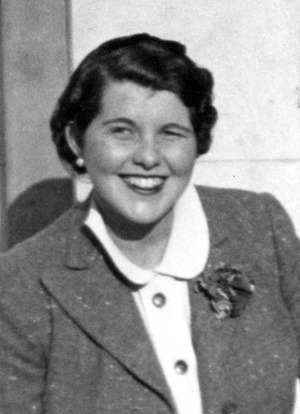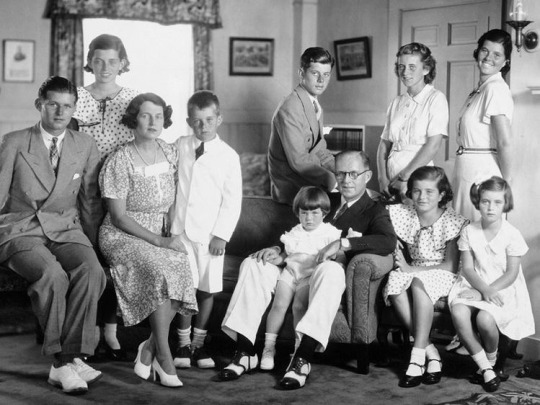#Rosemary kennedy
Text

rosemary
31 notes
·
View notes
Text
the only reason to believe in a higher power is the Kennedy Curse, 'cause my theory is that God, being omnipotent, saw what Joseph Senior was going to do to Rosemary, and then said "well if you like sticking bits of metal in your child's brain then why stop at the daughter?"
#i don't know the intricacies of Joseph Kennedy Junior's violent death but I'm willing to hedge my bets he took metal to the brain too#jfk#Rosemary Kennedy#kennedy curse
56 notes
·
View notes
Text
I hate when people talk about Rosemary Kennedy without actually knowing what they’re talking about and say that she was lobotomized for being a freethinking woman.
She was lobotomized for showing symptoms of mental illness. She had been a free thinker in the past and had defied her father and her family, but the reason she was lobotomized were for showing signs of mental illness including confusion, mood swings, and violent outbursts.
People that want to frame it as a feminist issue rather than a saneist one are furthering that saneism by refusing to acknowledge her very real illness and distress, which is exactly the stigma her father feared when he had her lobotomized.
76 notes
·
View notes
Photo

A photograph of Rosemary Kennedy before her father forced her to have a lobotomy at the age of 23. The lobotomy went wrong and left her paralyzed and unable to speak. Her father then placed her in a mental institute where she remained until she passed away at the age of 86. After the surgery, her family, including JFK, never spoke of her again.
286 notes
·
View notes
Text

The Kennedys in England - c. 1938
L to R: Eunice, Jack, Rosemary, Jean, Joe Sr, Ted, Rose, Joe Jr, Pat, Bobby, Kick
#joe kennedy sr#rose kennedy#rose fitzgerald kennedy#joe kennedy jr#john f kennedy#jfk#rosemary kennedy#kick kennedy#kathleen kennedy cavendish#eunice kennedy#eunice kennedy shriver#patricia kennedy#patricia kennedy lawford#robert f kennedy#rfk#bobby kennedy#jean kennedy#jean kennedy smith#ted kennedy#edward m kennedy#emk#kennedy family#the kennedys
30 notes
·
View notes
Text
will never not be depressed over rosemary kennedy. He had her awake and talking the whole time only so he would know he completely destroyed her brain. he only stopped when she was no longer able to respond.
#i cant even imagine how horrified she mustve been#i know the brain has no nerve endings#but i cant even imagine how painful it would be to have all those neurons and all those sections of your brain completely turned to mush#it makes me sick#to feel yourself get more and more incoherent and vegetable like#it's emotionally traumatic for people to experience brain damage like this from sudden impacts#imagine it being carried out over an hour or more#god#rosemary kennedy
24 notes
·
View notes
Text





“It has been said, 'time heals all wounds.' I do not agree. The wounds remain. In time, the mind, protecting its sanity, covers them with scar tissue and the pain lessens. But it is never gone."
- Rose Fitzgerald Kennedy
#when they were young#the kennedys#first family#rose kennedy#joseph kennedy jr.#john f. kennedy#jfk#robert f. kennedy#rfk#kathleen kennedy#patricia kennedy#eunice kennedy shriver#jean kennedy smith#rosemary kennedy#edward kennedy#ted kennedy#kennedy family#old money#vintage
93 notes
·
View notes
Text

Rosemary Kennedy reading a book.
29 notes
·
View notes
Text
I hate the Kennedy family. I know they're a big deal in US politics, but they're almost all awful people. Let's discuss:
Family Patriarch Joseph Sr was an antisemitic man who wanted to compromise with Hitler. He was also a defeatist and very pessimistic. After like 1 year in England, he was convinced that the Nazis would win and that "democracy was finished in Britain". Quite a stellar man, no?
Then there's the story of how he gave one of his teen daughters a lobotomy because she had an intellectual disability. I'm not kidding. Rosemary Kennedy was given a lobotomy and shuffled off to a home, all because her dad thought she wasn't good enough.
Not like some of the kids were much better. JFK was a womanizer who constantly slept around on his wife. Joseph Jr died at 29, but that's a good thing. He was the oldest of the kids, and he openly praised Hitler and Eugenics. RFK cheated as much as JFK, and his son is now a nut who claims vaccines cause autism.
Finally, their youngest kid was Ted. Ted Kennedy also sucked. I know he died of Brain Cancer like my mom did, but I'm calling it as I see it. Ted Kennedy was drunk and drove and off a bridge. He had another passenger with him: 28 year old Mary Jo Kopechne. Ted Kennedy swam out of the car to safety, but went back to his hotel and slept soundly as she drowned. He never bothered to rescue her. And he did all this while his wife was pregnant! What a sleazy man.
The only Kennedy branch I respect are the Shrivers. Eunice Kennedy-Shriver was the founder of the Special Olympics. She was also the closest to Rosemary before the lobotomy. Eunice was the best of the lot. Besides Eunice and Rosemary, the rest of the family can go to hell for all I care. America's worst dynasty. A bunch of sleazy people in that family.
#Anti JFK#Anti RFK Jr#Anti Ted Kennedy#politics#us politics#rosemary kennedy#eunice kennedy shriver#usa politics#united states#my thoughts
46 notes
·
View notes
Photo


The Secret Lobotomy of Rosemary Kennedy
On September 13, 1918, Rose Kennedy, wife of prominent businessman Joseph Kennedy Sr., went into labor with her third child. Rose's obstetrician was called to the Kennedys' home, but with a pneumonia epidemic raging through Boston, he failed to arrive before the baby entered the birth canal. A nurse, desperate to stop the delivery until the doctor arrived, held Rose's legs closed. When that failed, she reached into Rose's birth canal and held the baby's head in place for an unbelievable two hours.
In the quickly expanding household of boisterous, competitive Kennedys, Rosemary was often left behind. She was held back in school, until finally Rose hired private tutors for Rosemary and kept her at home. Watching her brothers and sisters go out without her left Rosemary angry and confused. She had "fits," which could have been seizures or episodes of mental illness. Afraid of Rosemary's vulnerability, Rose never let her leave the house alone. Rosemary also often ran away.
In the 1920s, the stigma associated with mental disability could ruin a family. Many Americans, including prominent members of society like Teddy Roosevelt, Andrew Carnegie, and John D. Rockefeller, believed in eugenics, a pseudoscience that advocated for forced sterilization of the "defective," a group that included the mental and physically disabled. And then, of course, the Kennedys were devout Catholics, whose church deemed disability the result of sin—a punishment from God.
Rosemary's disability was a challenge her mother couldn't face alone. At age 11, Rosemary was sent to boarding school. Over the next nine years, she attended five different schools. Her letters home show a young girl struggling to get it right. She wrote in a childish script that slants down dramatically off the page. She misspelled words and wrote incomplete sentences. Each letter is filled with a daughter's a desperate desire for approval and affection.
While in Britain, Rosemary found brief respite. She was enrolled in Belmont House, a boarding school run by Catholic nuns who embraced the Montessori Method of education, which focused on learning through practical skills and hands-on activities. Rosemary flourished under the guidance of the nuns, who trained her to be a teacher's aide. But after the Germans marched on Paris in the summer of 1940, her family brought her back to the States. Rosemary's reprieve was over.
Back at home, Rosemary watched her siblings begin their lives and careers, while she wasn't even allowed outside alone. Rose tried to find another school for her daughter, but few places were equipped to take a disabled adult in her 20s. Rosemary was eventually sent to a convent, where she began sneaking out at night and going to bars.
Joe Sr. was busy plotting the political career of his two oldest sons. Wanting to avoid scandal and looking to find a cure for his daughter's erratic behavior, he began speaking to Dr. Walter Freeman and his associate Dr. James Watts, the leading practitioners of lobotomies in America. At the time, the procedure was heralded as a cure for the physically disabled and mentally ill..
Joe Sr. discussed the procedure with Rose, who asked their daughter Kathleen to look into it. Kathleen spoke with a reporter, John White, investigating mental illness and treatments. White told Kathleen that the effects of lobotomies were "no good." Clifford Larson writes that Kathleen immediately reported back to her mother: "Oh, Mother, no, it's nothing we want done for Rosie." But whether out of desperation or determination, Joe Sr. went ahead with the surgery.
At the age of 23, Rosemary was admitted to George Washington University Hospital, where she was strapped to a table and given an anaesthetic to numb the areas of her brain where Freeman and Watts would drill two small holes. They then inserted a small metal spatula and sliced the connections between her pre-frontal cortex and the rest of her brain. (Freeman often used ice picks for the procedure, hammering the pick in through the eye socket.) Rosemary was wide awake the whole time. The doctors had her recite poems as they cut—when she was silent, they knew the procedure was complete.
The hope was that the procedure would subdue Rosemary and end her rebellious jaunts about town. But the result was far more extreme: After the lobotomy, Rosemary was no longer able to walk or talk. It took months of therapy before she regained the ability to move on her own, recouping only the partial use of one arm. One of her legs was permanently turned inward. Months after the surgery, when she regained her ability to speak, it was a mix of garbled sounds and words. The result must have been shocking to Joe Sr., who had clung to the procedure as his last hope for Rosemary. But it couldn't have shocked Dr. Freeman, who had no surgical training and no proof of the astounding results he had claimed.
Immediately after the surgery, Joe Sr. moved Rosemary to Craig House, a psychiatric care facility where Zelda Fitzgerald once stayed. At the end of the 1940s, Joe Sr. had her moved to Saint Coletta's, a residential care facility in Jefferson, Wisconsin, where Rosemary lived until her death in 2005.
For 20 years, Rosemary was hidden from her family.
In 1961, Joe Sr. suffered a stroke, and in early 1962, Rose finally saw her daughter again. Koehler-Pentacoff, whose aunt was one of Rosemary's primary caretakers at Saint Coletta's, recalls being told that during their first meeting, Rosemary attacked her mother. Angry, wounded, and abandoned, Rosemary was fighting for herself.
Twenty years after the barbaric procedure that derailed Rosemary's life, the Kennedys began to fight for her too. Rosemary's sister Eunice Kennedy Shriver founded the Special Olympics in 1968 and became a leading advocate for disability rights. Rosemary's nephew Anthony Shriver became an activist for people with developmental disabilities and founded the non-profit Best Buddies International. Rosemary's older brother John F. Kennedy, who became the 35th president of the United States, signed the Maternal and Child Health and Mental Retardation Planning Amendment to the Social Security Act, the first major legislation to combat mental illness and retardation, in 1963. It was a precusor to the American's with Disabilities Act, which Rosemary's little brother Ted—who served as a Democratic Senator for Massachusetts from 1962 until his death in 2009—championed. (It was eventually made law in 1990.) Ted Kennedy also sat on the board of the American Association of People with Disabilities.
141 notes
·
View notes
Text


The Secret Lobotomy of Rosemary Kennedy
On September 13, 1918, Rose Kennedy, wife of prominent businessman Joseph Kennedy Sr., went into labor with her third child. Rose's obstetrician was called to the Kennedys' home, but with a pneumonia epidemic raging through Boston, he failed to arrive before the baby entered the birth canal. A nurse, desperate to stop the delivery until the doctor arrived, held Rose's legs closed. When that failed, she reached into Rose's birth canal and held the baby's head in place for an unbelievable two hours.
In the quickly expanding household of boisterous, competitive Kennedys, Rosemary was often left behind. She was held back in school, until finally Rose hired private tutors for Rosemary and kept her at home. Watching her brothers and sisters go out without her left Rosemary angry and confused. She had "fits," which could have been seizures or episodes of mental illness. Afraid of Rosemary's vulnerability, Rose never let her leave the house alone. Rosemary also often ran away.
In the 1920s, the stigma associated with mental disability could ruin a family. Many Americans, including prominent members of society like Teddy Roosevelt, Andrew Carnegie, and John D. Rockefeller, believed in eugenics, a pseudoscience that advocated for forced sterilization of the "defective," a group that included the mental and physically disabled. And then, of course, the Kennedys were devout Catholics, whose church deemed disability the result of sin—a punishment from God.
Rosemary's disability was a challenge her mother couldn't face alone. At age 11, Rosemary was sent to boarding school. Over the next nine years, she attended five different schools. Her letters home show a young girl struggling to get it right. She wrote in a childish script that slants down dramatically off the page. She misspelled words and wrote incomplete sentences. Each letter is filled with a daughter's a desperate desire for approval and affection.
While in Britain, Rosemary found brief respite. She was enrolled in Belmont House, a boarding school run by Catholic nuns who embraced the Montessori Method of education, which focused on learning through practical skills and hands-on activities. Rosemary flourished under the guidance of the nuns, who trained her to be a teacher's aide. But after the Germans marched on Paris in the summer of 1940, her family brought her back to the States. Rosemary's reprieve was over.
Back at home, Rosemary watched her siblings begin their lives and careers, while she wasn't even allowed outside alone. Rose tried to find another school for her daughter, but few places were equipped to take a disabled adult in her 20s. Rosemary was eventually sent to a convent, where she began sneaking out at night and going to bars.
Joe Sr. was busy plotting the political career of his two oldest sons. Wanting to avoid scandal and looking to find a cure for his daughter's erratic behavior, he began speaking to Dr. Walter Freeman and his associate Dr. James Watts, the leading practitioners of lobotomies in America. At the time, the procedure was heralded as a cure for the physically disabled and mentally ill..
Joe Sr. discussed the procedure with Rose, who asked their daughter Kathleen to look into it. Kathleen spoke with a reporter, John White, investigating mental illness and treatments. White told Kathleen that the effects of lobotomies were "no good." Clifford Larson writes that Kathleen immediately reported back to her mother: "Oh, Mother, no, it's nothing we want done for Rosie." But whether out of desperation or determination, Joe Sr. went ahead with the surgery.
At the age of 23, Rosemary was admitted to George Washington University Hospital, where she was strapped to a table and given an anaesthetic to numb the areas of her brain where Freeman and Watts would drill two small holes. They then inserted a small metal spatula and sliced the connections between her pre-frontal cortex and the rest of her brain. (Freeman often used ice picks for the procedure, hammering the pick in through the eye socket.) Rosemary was wide awake the whole time. The doctors had her recite poems as they cut—when she was silent, they knew the procedure was complete.
The hope was that the procedure would subdue Rosemary and end her rebellious jaunts about town. But the result was far more extreme: After the lobotomy, Rosemary was no longer able to walk or talk. It took months of therapy before she regained the ability to move on her own, recouping only the partial use of one arm. One of her legs was permanently turned inward. Months after the surgery, when she regained her ability to speak, it was a mix of garbled sounds and words. The result must have been shocking to Joe Sr., who had clung to the procedure as his last hope for Rosemary. But it couldn't have shocked Dr. Freeman, who had no surgical training and no proof of the astounding results he had claimed.
Immediately after the surgery, Joe Sr. moved Rosemary to Craig House, a psychiatric care facility where Zelda Fitzgerald once stayed. At the end of the 1940s, Joe Sr. had her moved to Saint Coletta's, a residential care facility in Jefferson, Wisconsin, where Rosemary lived until her death in 2005.
For 20 years, Rosemary was hidden from her family.
In 1961, Joe Sr. suffered a stroke, and in early 1962, Rose finally saw her daughter again. Koehler-Pentacoff, whose aunt was one of Rosemary's primary caretakers at Saint Coletta's, recalls being told that during their first meeting, Rosemary attacked her mother. Angry, wounded, and abandoned, Rosemary was fighting for herself.
Twenty years after the barbaric procedure that derailed Rosemary's life, the Kennedys began to fight for her too. Rosemary's sister Eunice Kennedy Shriver founded the Special Olympics in 1968 and became a leading advocate for disability rights. Rosemary's nephew Anthony Shriver became an activist for people with developmental disabilities and founded the non-profit Best Buddies International. Rosemary's older brother John F. Kennedy, who became the 35th president of the United States, signed the Maternal and Child Health and Mental Retardation Planning Amendment to the Social Security Act, the first major legislation to combat mental illness and retardation, in 1963. It was a precusor to the American's with Disabilities Act, which Rosemary's little brother Ted—who served as a Democratic Senator for Massachusetts from 1962 until his death in 2009—championed. (It was eventually made law in 1990.) Ted Kennedy also sat on the board of the American Association of People with Disabilities.
18 notes
·
View notes
Text


#eigenes#allein#depressiv#leben#kaputt#schmerz#britney spears#rosemary kennedy#lobotomy#live laugh lobotomy
2 notes
·
View notes
Text

#Rosemary Kennedy#the most beautiful of Joe Sr. and Rose Kennedy's daughters. Brutally lobotomized at age 23 in 1941 at her father's behest. Here she is in 1#mildredfierce1969#oldschool
18 notes
·
View notes
Text
Something I made for #rosemarykennedy it is so sad what did went through. #RIP #miss #Kennedy #President

2 notes
·
View notes
Text

The Kennedys - c. 1930s
#joe kennedy sr#rose kennedy#rose fitzgerald kennedy#joe kennedy jr#john f kennedy#jfk#rosemary kennedy#kick kennedy#kathleen kennedy#kathleen kennedy cavendish#eunice kennedy shriver#eunice kennedy#patricia kennedy#patricia kennedy lawford#robert f kennedy#rfk#bobby kennedy#jean kennedy#jean kennedy smith#ted kennedy#edward m kennedy#emk#kennedy family#the kennedys
38 notes
·
View notes


